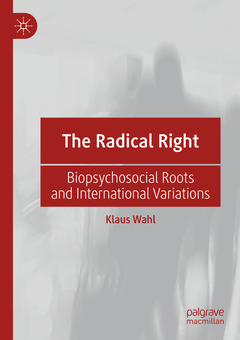Description
The Radical Right, 1st ed. 2020
Biopsychosocial Roots and International Variations
Author: Wahl Klaus
Language: English
Subject for The Radical Right:
Keywords
populism; nationalism; xenophobia; transnationalism; political violence
Publication date: 11-2020
379 p. · 14.8x21 cm · Paperback
Publication date: 11-2019
379 p. · 14.8x21 cm · Hardback
Description
/li>Contents
/li>Biography
/li>Comment
/li>
This book analyses the rise in xenophobia, racism, and radical right political parties, movements, and violent groups over recent years.
The author provides a summary of the current state of international and interdisciplinary research on the multilevel explanations of right-wing radical thought, comparing similarities and differences across Europe and the United States. By integrating findings from psychology, history, social and life sciences, he proposes a biopsychosociological model of the conditions, causes, catalysts, and triggers of phenomena of the radical right across the world. Following a ?demand? and ?supply? analysis, Wahl explores the interaction of evolutionary emotional mechanisms and socialization processes with various environmental conditions, and consequent manifestations of radical right groups, to identify strategies to slow down the rise and effects of the radical right.
1. The Radical Right: More Than a Topic of Political Science.- 2. Fear, Hate, and Hope: A Biopsychosociological Model of the Radical Right.- 3. Psychological and Biological Factors: From Personality Back to Evolution. - 4. Sociological and Historical Factors: From the Present Society Back to History. - 5. The Radical Right in Europe: Variations of a Socio-Political Phenomenon. - 6. The Radical Right in Europe: Sociological and Historical Causes and Conditions. - 7. Making America Great Again? The Radical Right in the United States; Klaus Wahl and Heather Painter.- 8. Bundling Insights, Expanding Horizons, and Offering Solutions.
Klaus Wahl is Head of Psychosocial Analyses and Prevention – Information System (PAPIS) and has been Professor at the Ludwig-Maximilians-Universität München, Germany.



